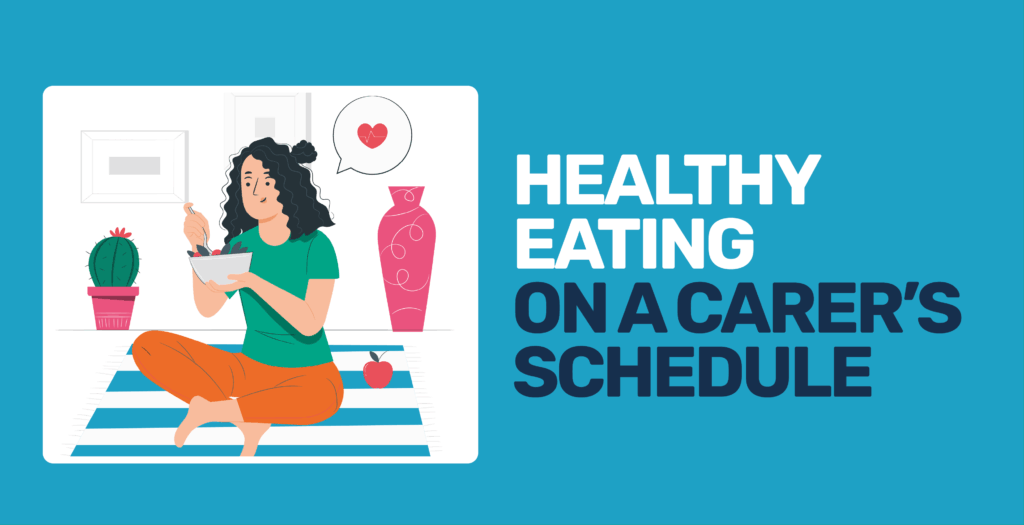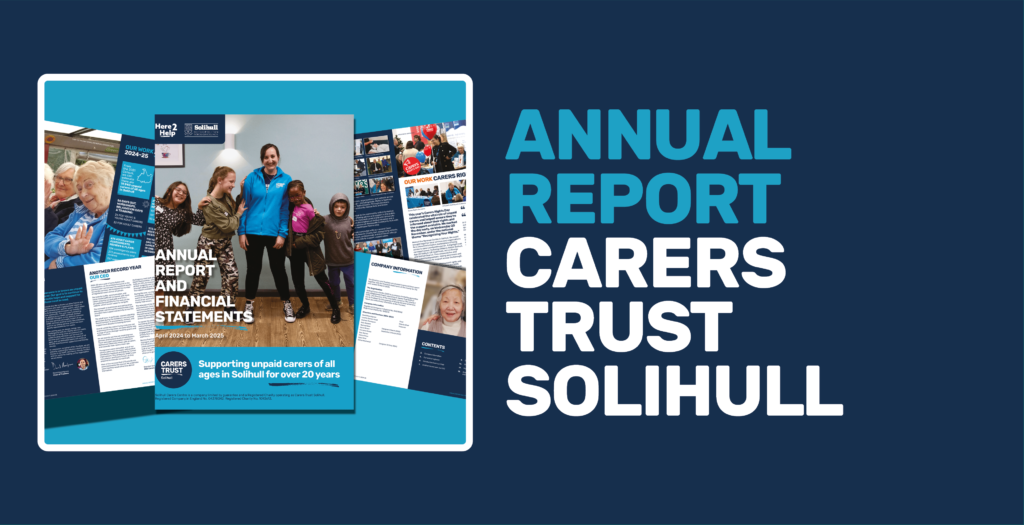Quick and healthy eating (without losing the flavour) to fuel you when you're on the busy schedule of an unpaid carer - looking after yourself helps you to look after others.
When you’re an unpaid carer, it’s far too easy to put yourself at the bottom of the list of priorities. Whether you’re a teenager juggling school, friends and caring, or a working adult trying to balance your caring role with working, family responsibilities and managing a home. Our days can often be busy and unpredictable, so finding time to cook or sit down and eat a balanced meal may feel like a luxury.
It’s important to recognise that healthy eating doesn’t mean you must use complicated recipes or expensive ingredients. With some simple planning, it’s possible you can be enjoying the luxury of a nutritious home-cooked meal every day of the week. Doing so will make a real difference in your life, to your energy, mood, focus, overall health, and happiness – who doesn’t smile at the sight of a gravy-filled Yorkshire pudding?
With this guide, we are going to share with you some simple, practical and affordable meal and snack ideas, tips to stay hydrated, and doing it all while letting you control your own budgets – both time and money – that will help unpaid carers of all ages maintain a nutritious diet, but also give you the knowledge so you can make sure the people you care for also are given what their bodies need.
meals that save time and energy
Whether you’re helping someone else to wash, cook, attend appointments, or manage medication – it can often feel like your day is packed from the moment your eyes open until you can finally get some sleep. Many unpaid carers have reported on skipping meals due to their busy schedules, as well as the financial and emotional strains that can occur from providing care. When things are tough, it’s been shown that unpaid carers are more likely to put other’s needs above their own.
However, your body and mind need regular and balanced nutrition to keep firing on all cylinders. Skipping a meal or relying on processed foods can be direct causes of blood sugar crashes, loss of focus, poor sleep, weakened immunity, mental fog and low energy. We feel these effects after just a day or two of poor diet, but it’s often been happening for weeks, months or even years. Over time, this kind of diet, or lack thereof, can lead to long-term conditions like diabetes, depression and worse.
It’s so important, and why we are reinforcing the message, that you look after yourself and fuel the body with the foods and liquids it needs. No matter your age, whether a young carer or adult carer, your bodies still need the same nutrients but also, when starting the right way as soon as possible, it creates habits and routines that will benefit in short-term and long-term.
Below, we have some low-effort, practical and affordable options for meals to help you get started on your journey.
- Overnight Oats: Porridge in a Jar
Oats are a lifesaver for anyone who is busy, but especially for unpaid carers who are short on time in the morning and have places to be, sometimes at the crack of dawn. Oats (rolled or instant, your choice and both nutritious) are a slow-releasing carbohydrate that helps maintain your energy and blood sugar balance, as well as decreasing cholesterol.
Porridge can be as simple as mixing oats with milk or plant-based alternative (depending on how thick or runny you like your porridge). You could add some extras to boost its flavour to your liking, as well as it’s nutritional content. Popular choices are bananas, berries, and slices of apple, which are rich in vitamins and fibre. Buy frozen fruit and berries to save you money and reduce potential waste – frozen fruit and vegetables offer the same, if not more, goodness than fresh varieties. You could also throw in some chia seeds, peanut butter, or even a protein powder, for added protein and slow release energy. Chia seeds also offer Omgea-3s, so in one portion of porridge, you have an appetite filling, body and mind-boosting breakfast with minimal effort and time.
Why not make a bigger batch when you get the time? Porridge can store in the fridge for up to 5 days, or frozen for up to 3 months!
- Slow Cooker: Set and Forget Solutions
When you don’t have the time to spend in front of an oven or running around and prepping ingredients at specific times, a slow cooker, also known as a Crock Pot – a brand synonymous with the appliance, similar to vacuum cleaners and Hoover – can save your day. Depending on what it is you’re cooking, it could take 10–15 minutes of prep time, and the cooking is done throughout the day, with no supervision needed.
The versatility of the slow cooker, means that no matter your likes and dislikes, or dietary requirements, there really is something for everyone! Here’s some easy, nutritious, and delicious ideas:
-
Lentil and vegetable stew: Lentils, diced carrots, celery, stock, herbs
-
Mild chicken curry: Chicken thighs, onion, curry paste, tinned tomatoes, chickpeas
-
Sausage and bean casserole: Cooked sausages, tinned beans, onions, passata, paprika
Throw the ingredients in the slow cooker, turn it on and a few hours later, you have a beautifully cooked meal for you and the person you care for. Ensuring you both are getting the dietary requirements your body, mind and even mood are craving.
Slow cookers can have quite a substantial size to them, so you could get a good 4 – 6 portions each use. Again, perfect for bulk cooking and prepping your meals for the next few days, or when frozen for the following weeks and months. Again, as with the porridge recipes, use frozen or tinned vegetables. They store for longer and work out cheaper, as well as making it quicker for a busy carer to portion correctly.
If you don’t have a slow cooker then you can use a casserole dish and place it in the oven or on the hob, for a one pot meal. However, depending on a lot of factors, this may not be every cost-effective for fuel costs. That will be up to you, but slow cookers can be bought for around £15 brand new – or deals can be had at local charity shops or car boot sales. So, keep your eye out. Having the ability to prepare an up to a weeks worth of meals with 15 minutes of effort is priceless, when you already have a packed schedule.
- One Tray Bakes: Hot Dinner, Full Bellies, Minimal Washing Up
This is one of the easiest ways to make a healthy and balanced meal. You may have noticed that we’ve been focusing on short prep times for maximum outcome, and tray bakes are no different. They are after all made up of three main elements:
-
Starch: Potatoes, sweet potatoes, or squash, etc.
-
Veg: Peppers, courgettes, broccoli, red onion, etc.
-
Protein: Chicken, halloumi, sausages, chickpeas, tofu, etc.
Not only is the prep time short, but again, it’s all customisable to your tastes and dietary needs. For example, add some oil to an oven tray, then some sausages, potatoes, onions, peas, any herbs and spices you like, mix it together and then cook. In around 40 minutes or so, you’ll have multiple portions for days or weeks to come if, again, you refrigerate or freeze your extra portions.
Again, you can save time and money using frozen ingredients without losing any health benefits.
- The Forgotten Heroes: Frozen Vegetables
Many people believe that fresh is best but as we’ve mentioned several times now, frozen and tinned foods are just as, if not more nutritious than fresh. One thing to be certain of is that they are much more convenient to store and have at hand for meal prep, especially when you’re already busy with your caring role. They last longer and are often cheaper than fresh, with the same or higher yields too. Frozen vegetables will more than likely come fully skinned and chopped for you, too, saving more precious time and energy.
Here are some quick lists of examples, of a variety of pre-chopped vegetables that can be bought frozen, or you can freeze yourself, but all are great to have to create a massive variety of meals:
-
Chopped onions & garlic: Skip the tears and hassle. Use straight from frozen in soups, stews, stir-fries, or pasta sauces.
-
Sliced peppers & mushrooms: Perfect for omelettes, fajitas, or pizzas.
-
Spinach or kale: Stir into soups, pasta, scrambled eggs, or rice dishes for a quick iron and fibre boost.
-
Mixed vegetable bags: Great for adding to rice, noodles, or casseroles.
-
Stir-fry mixes: Typically include bean sprouts, carrots, cabbage, and peppers. Just toss into a hot pan with oil and soy sauce or a splash of hoisin.
-
Mediterranean mixes: Often include courgette, aubergine, tomatoes, and red onions. These roast well or can go straight into pasta or couscous.
-
Pre-cooked rice packs (microwaveable): Ready in 2 minutes. Choose wholegrain or brown for extra fibre and sustained energy.
-
Frozen mashed potato: No peeling or mashing needed. Great with gravy, beans, or as a pie topping.
-
Gnocchi or frozen pasta: Cook straight from frozen and mix with pesto, tomato sauce, or frozen veg.
-
Banana chunks: Use for smoothies or mash into porridge.
-
Grated cheese: Saves money and prep. Sprinkle into pasta or over jacket potatoes.
-
Ready-cooked chicken or meat-free options: Look for grilled chicken, meatballs, or veggie burgers you can oven-cook in under 20 mins.
You can cook most frozen vegetables from frozen—no need to thaw!
- The Forgotten Heroes: Long-Life Cupboard Options
Cupboard staples are often inexpensive, last for months, and form the base of many easy meals. Stocking a few versatile items can help you pull together a nutritious meal even when the fridge is empty or the shops feel out of reach.
-
Tinned tomatoes: Use for pasta sauces, chilli, casseroles, or curry bases.
-
Tinned chickpeas or lentils: High in protein and fibre. Rinse and use in salads, soups, or curries.
-
Tinned sweetcorn or peas: Add to pasta, sandwiches, or fritters.
-
Tinned sardines, tuna, or mackerel: Great on toast, mixed into pasta, or added to salads. Rich in omega-3s.
-
Pasta: Boil, then mix with tinned tomatoes and frozen veg for a fast dinner.
-
Wholegrain rice: More filling than white rice and helps keep blood sugar stable.
-
Couscous: No hob required: just pour boiling water over and cover. Flavour with herbs, lemon, or a stock cube.
-
Quinoa, bulgur wheat, or noodles: Keep these on hand for variety and balance.
-
Peanut or almond butter: Spread on toast or stir into porridge. Also great in satay sauces for noodle dishes.
-
Dried herbs and spices: Add flavour to basic ingredients without extra salt. Try mixed herbs, paprika, garlic powder, or curry powder.
-
Oats: Use for porridge, overnight oats, baking, or blending into smoothies.
- Smart Snacking
Snacking often becomes a lifeline when you’re running from task to task—but what you snack on can make a big difference. We all too often can snack on whatever’s quickest—biscuits, crisps, sugary drinks—especially when stressed, tired, or haven’t had a full meal. These obstacles to smart snacking can come along far quicker when you’re an unpaid carer, and can seem a lot higher and harder to get over, too. But those high-sugar or high-fat snacks can lead to energy crashes, mood dips, and a cycle of poor eating.
The key? Snacks that include protein, fibre, and healthy fats—which slow digestion and keep you fuller for longer. We spoke about habits before, and this is where those old habits can be most prevalent, as grabbing for a snack is often led by impulses and cravings. So, we need to work on finding some suitable replacements for when those cravings strike.
Let’s try some snack-swaps!
Biscuits and chocolate bars
Instead of reaching for custard creams or bourbons, make your own oat biscuits from scratch in just 25 minutes, and coat them in a peanut or almond butter. If you’re allergic to nuts, or just don’t like them, then try making your own dark chocolate spread to cover your oat biscuits, as well as other snacks too, for a quick and healthier alternative.
Did you know that dark chocolate can have many health benefits? When we think of chocolate, we often think of milk chocolate, which has sugars added to it and the cocoa diluted with milk (unsurprisingly). So, make a simple chocolate sauce using the recipe below, coat your oat biscuits with it, pop them in the fridge to cool and harden, then you have your own dark chocolate biscuits!
The below recipe calls for 75% cocoa dark chocolate, but the higher cocoa, the more of the added benefits you get. So try out a few and see what you prefer.
When you get confident, batch cook and store them. Grab some food bags or containers, and portion out some so you can grab a pack when you have to pop out, so you avoid pulling into a corner shop or garage to grab something that’s not good for you.
Don’t forget, you can also customise your oat biscuits with whatever you like – including their shape and size. Just focus on keeping them as balanced as possible, and you’ll have a guilt-free, delicious and nutritious snack whenever you need one.
Crisps
“It’s a potato, you’ve mentioned spuds several times throughout this guide – why can’t I have crisps?”
We know crisps might seem convenient to grab and pop in a bag for snacking on, and they are in fact potatoes. However, they are also oils, fats, and basically zero nutritional value. It gets worse I’m afraid for the favourite snack of a lot of us; when cooked at high temperatures – fried or baked – they can form a chemical called acrylamide, that can cause cancer.
So, we need to cut back on crisps and a good snack-swap is air-popped popcorn. Air-popped, unflavoured popcorn is a low-fat, low-calorie whole grain that’s high in fibre and contains small amounts of vitamins and minerals like iron and B vitamins. It’s even gluten-free, just double-check the ingredients if you buy pre-popped corn.
Its fibre content supports digestion and helps you feel full, while offering antioxidant benefits that may aid circulation and reduce cancer risk. The healthiest option is plain or lightly spiced popcorn without added fats, sugar, or salt.
A portion of 25–30g is ideal, which is around the size of a standard bag of crisps, so it’s not as drastic a swap as you’d imagine. If you have a popcorn machine at home, then you should already know just how simple it is to make: put in kernels, turn on, wait for the popped goodness. If you don’t have one yet, then have a look at what’s on offer. The price and sizes can start at around £20 and take up as much space as a few tins of baked beans, going up to machines larger than most microwaves and cost about as much. It all depends on you, but don’t forget our recurring message – quick prep for long time foods. Five minutes of popping, and you’ll have multiple portions of your new favourite snack.
Fizzy Drinks and Hydration
Although all fluids we drink, besides alcohol, counts towards to our daily intake, the contents of what drink should be taken into account, especially fizzy drinks and energy drinks. they are often filled with sugar and offering no nutritional value whatsoever, and energy drinks have the added load of caffeine too. Caffeine can help with alertness, but it can also increase your heart rate and anxiety, which can last long after you’ve finished drinking it. Having a drink containing caffeine, such as energy drinks, coffee, and even tea, at around 7pm, can still affect you by 2am. Carers need their sleep, so being up until the middle of the night with added anxiety seems a like a good place to make a swap.
As boring as it may seem, water really is the best liquid you should be drinking. It’s suggested we hsould be drinking around 6 – 8 glasses of it per day. However, this can vary wildly based on height, weight, gender, weather, sweating, having a fever, or exercising. So, a better way to measure your dehydration levels is to check your urine. Pale and odourless generally means you’re well hydrated. If your urine is dark with a strong odour, then you need to drink more! Click here for a handy guide on differentiating colours.
To help you keep drinking your water, try adding some flavour in a more natural way. Put a bottle of water in the fridge overnight with some added cucumber, berries, or lemon. That will give you the hydration without the sugar spike and crash.
-
Keep a reusable water bottle with you: You’re more likely to sip throughout the day. If it is a thermal bottle, add some ice and keep your drink cold throughout the day too.
-
Flavour water naturally: Add cucumber, mint, lemon slices, or frozen berries.
-
Drink herbal teas: Chamomile, rooibos, and peppermint all count.
-
Eat water-rich foods: Cucumber, melon, soups, and yoghurts all help.
-
Use a straw or small cup: Especially for older carers or those with dexterity issues.
-
Get fun water bottles they like using: Especailly for young carers
-
Encourage drinking between classes, or after every care task.
-
Offer diluted fruit juice if plain water is boring: Then gradually transition them with water that has added fruits to it.
A gentle reminder
It may seem like we are trying to say you shouldn’t have any treats or sweets ever again. We’re not. Without some cake, life could be awfully dull. What this guide is for is to help you find time, methods and the ingredients that your body is craving for, so you’re aware of them. As unpaid carers, it is in your nature to ignore your own needs and to focus on others. However, when you get into habits then it’s difficult to avoid those same habits with the people you care for, and we know you only want what’s best for them – we want what’s best for you.
So, learn what it takes to keep your body and mind working at a high level; efficiently, happily, comfortably and effectively. We don’t want you to stop enjoying life, have a slice of cake on a birthday, have a treat of ice cream on a hot day, celebrate with champagne or a pint now and then. The issues and problems begin, however, when every day you struggle to maintain what your body needs. That’s what we have been trying to help with. To show you that there are options available, and those options can be much better for you than the more common that you may be used to.
If you follow our advice you can prepare an oat breakfast, with some biscuits and popcorn for a snack, and prep a slow cooked stew for dinner time. All the prep time will be around 30 minutes, but you can cook enough to last you a whole week or longer, and do it for cheap too.
That’s what we want you to take from this guide – you don’t have to struggle to eat well, and eating well is the best way you can look after yourself and the person you care for.






